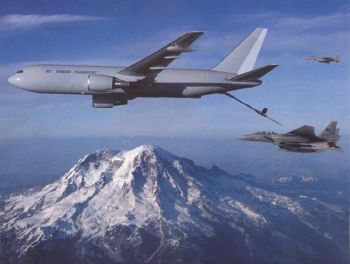
Publisher:
Bonnie King
CONTACT:
Newsroom@Salem-news.com
Advertising:
Adsales@Salem-news.com

~Truth~
~Justice~
~Peace~
TJP
Mar-11-2008 13:43

 TweetFollow @OregonNews
TweetFollow @OregonNews
Boeing Files Protest Over Air Force Tanker Contract Award
Salem-News.comBoeing is asking the GAO to examine several factors in the competition that they say were fundamentally flawed.
 KC-767 Photo courtesy: U.S. Air Force |
(ST. LOUIS) - Citing irregularities with the process of the competition and the evaluation of the competitors' bids, The Boeing Company has filed a formal protest with the Government Accountability Office, asking the agency to review the decision by the U.S. Air Force to award a contract to a team of Northrop Grumman and European Aeronautic Defence and Space Company to replace aerial refueling tankers.
"Our analysis of the data presented by the Air Force shows that this competition was seriously flawed and resulted in the selection of the wrong airplane for the warfighter," said Mark McGraw, vice president and program manager, Boeing Tanker Programs. "We have fundamental concerns with the Air Force's evaluation, and we are exercising our right under the process for a GAO review of the decision to ensure that the process by which America's next refueling tanker is selected is fair and results in the best choice for the U.S. warfighters and taxpayers."
Following a thorough analysis of data presented at a March 7 debriefing on the decision, Boeing concluded that what began as an effort by the Air Force to run a fair, open and transparent competition evolved into a process replete with irregularities. These irregularities placed Boeing at a competitive disadvantage throughout this competition and even penalized Boeing for offering a commercial-derivative airplane with lower costs and risks and greater protection for troops.
"It is clear that the original mission for these tankers -- that is, a medium-sized tanker where cargo and passenger transport was a secondary consideration -- became lost in the process, and the Air Force ended up with an oversized tanker," McGraw said. "As the requirements were changed to accommodate the bigger, less capable Airbus plane, evaluators arbitrarily discounted the significant strengths of the KC-767, compromising on operational capabilities, including the ability to refuel a more versatile array of aircraft such as the V-22 and even the survivability of the tanker during the most dangerous missions it will encounter."
Boeing is asking the GAO to examine several factors in the competition that were fundamentally flawed:
1. The contract award and subsequent reports ignore the fact that in reality Boeing and the Northrop/EADS team were assigned identical ratings across all five evaluation factors: 1) Mission Capability, 2) Risk, 3) Past Performance, 4) Cost/Price and 5) Integrated Fleet Aerial Refueling Assessment. Indeed, an objective review of the data as measured against the Request for Proposal shows that Boeing had the better offering in terms of Most Probable Life Cycle Costs, lower risk and better capability.
2. Flaws in this procurement process resulted in a significant gap between the aircraft the Air Force originally set out to procure -- a medium-sized tanker to replace the KC-135, as stated in the RFP -- and the much larger Airbus A330-based tanker it ultimately selected. It is clear that frequent and often unstated changes during the course of the competition -- including manipulation of evaluation criteria and application of unstated and unsupported priorities among the key system requirements -- resulted in selection of an aircraft that was radically different from that sought by the Air Force and inferior to the Boeing 767 tanker offering.
3. Because of the way the Air Force treated Boeing's cost/price data, the company was effectively denied its right to compete with a commercial-derivative product, contrary not only to the RFP but also to federal statute and regulation. The Air Force refused to accept Boeing's Federal Acquisition Regulation-compliant cost/price information, developed over 50 years of building commercial aircraft, and instead treated the company's airframe cost/price information as if it were a military-defense product. Not only did this flawed decision deny the government the manufacturing benefits of Boeing's unique in-line production capability, subjecting the Air Force to higher risk, but it also resulted in a distortion of the price at which Boeing actually offered to produce tankers.
4. In evaluating Past Performance, the Air Force ignored the fact that Boeing -- with 75 years of success in producing tankers -- is the only company in the world that has produced a commercial-derivative tanker equipped with an operational aerial-refueling boom. Rather than consider recent performance assessments that should have enhanced Boeing's position, the Air Force focused on relatively insignificant details on "somewhat relevant" Northrop/EADS programs to the disadvantage of Boeing's experience.
"Boeing offered an aircraft that provided the best value and performance for the stated mission at the lowest risk and lowest life cycle cost," said McGraw. "We did bring our A-game to this competition. Regrettably, irregularities in the process resulted in an inconsistent and prejudicial application of procurement practices and the selection of a higher-risk, higher-cost airplane that's less suitable for the mission as defined by the Air Force's own Request For Proposal. We are only asking that the rules of fair competition be followed."
Source: Boeing
Articles for March 10, 2008 | Articles for March 11, 2008 | Articles for March 12, 2008
Quick Links
DINING
Willamette UniversityGoudy Commons Cafe
Dine on the Queen
Willamette Queen Sternwheeler
MUST SEE SALEM
Oregon Capitol ToursCapitol History Gateway
Willamette River Ride
Willamette Queen Sternwheeler
Historic Home Tours:
Deepwood Museum
The Bush House
Gaiety Hollow Garden
AUCTIONS - APPRAISALS
Auction Masters & AppraisalsCONSTRUCTION SERVICES
Roofing and ContractingSheridan, Ore.
ONLINE SHOPPING
Special Occasion DressesAdvertise with Salem-News
Contact:AdSales@Salem-News.com
Salem-News.com:



Terms of Service | Privacy Policy
All comments and messages are approved by people and self promotional links or unacceptable comments are denied.
[Return to Top]
©2025 Salem-News.com. All opinions expressed in this article are those of the author and do not necessarily reflect those of Salem-News.com.